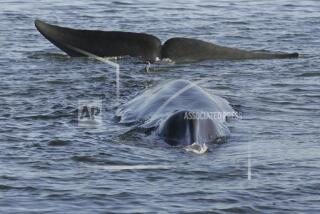Japan’s whaling logic doesn’t cut two ways
- Share via
TOKYO — The pro-whalers in the Japanese government have a ready answer when asked to explain why the global ban on commercial whaling should be lifted.
Whaling is part of Japan’s culture, they say. They point to archaeological evidence that whale meat has been a Japanese staple for more than 2,500 years. Respect for the “brave fish” courses through Japanese literature and paintings, they say, and has inspired folk festivals and puppet shows. Whales are so revered that the souls of the hunted and killed are commemorated in the Buddhist temples of Japan’s hunting ports.
Yet despite contending that tradition justifies the whale hunt, the Japanese government balks at accepting similar arguments from the Ainu people on the northern island of Hokkaido who want to fish for wild salmon. The Japanese government has long prevented the indigenous Ainu people from exercising their traditional hunting and fishing rights, including the right to catch salmon as they return to Hokkaido’s rivers to spawn.
Salmon have always been a food staple for the Ainu, such a fundamental element of their culture that they annually perform ceremonies to give thanks for the fish. Only in recent years has the government bent to Ainu lobbying and agreed to permit a small salmon haul that allows a few fish to be caught for ceremonial purposes.
This year’s allowance is 1,700 salmon, up from the 20 approved in previous years.
“I would not claim that my government is always consistent,” Joji Morishita, director for international negotiations for the Japanese government’s Fisheries Agency, said when asked about the discrepancy between how Japan wants its whalers to be treated and the restrictions it imposes on the Ainu community. “You cannot be perfect on every issue and unfortunately that’s happening in the case of the Ainu.”
The Japanese public knows nothing about the traditional Ainu salmon fishery, Morishita said, explaining that “governments are not famous for moving proactively.”
Japan is extremely proactive on the whaling front. Four vessels, including the factory whaler Nisshin Maru, left the port of Shimonoseki on Sunday for the South Pacific. Their declared aim is to kill 935 minke whales as well as 50 fin whales under a loophole in the 1986 global ban on commercial whaling that allows countries a hunt of an undefined size, provided the dead whales are used for scientific purposes.
More controversially, the Japanese fleet will also kill as many as 50 humpback whales this year. It is the first such legal hunt of humpbacks since 1963, when the species’ numbers had declined so precipitously that the International Whaling Commission imposed a global ban on killing them. The commission now says humpback numbers are increasing at a rate of about 10% a year, with the population now totaling about 42,000.
Critics scoff at Japan’s contentions that its killing is research. They challenge the scientific merit of the studies produced by Japanese whaling organizations. And they dismiss Japanese arguments that it must kill 50 humpbacks to measure pregnancy rates as part of a study of the Antarctic ecosystem.
This polarization between anti-whaling activists and the whale-hunting nations led by the Japanese has led to explosive confrontations. As it did last year, the conservation organization Greenpeace dispatched a vessel to try to obstruct the Japanese whalers from carrying out their hunt. The organization said Friday that it had been unable to locate the fleet.
Meanwhile the Japanese government sanctions an expanded hunt every year, despite the demonstrably minuscule domestic demand for whale meat. Morishita acknowledges that the motivation to restore the commercial hunt has little to do with satisfying the Japanese palate. If the ban on commercial whaling was lifted, he said, “the total take and consumption of whale meat would be in the neighborhood of what we are eating these days.”
Instead, the Japanese say the right to hunt whales is a matter of principle, which underscores the urgent need to find a way to accommodate clashing views over the management of limited global resources. They portray their defiant stand as a struggle to defend a sustainable hunt against an emotion-fueled campaign to save “charismatic species” by anti-whaling activists that has cowed Western governments.
This week, the United States, the European Union and the governments of Australia and New Zealand criticized Japan for proceeding with the hunt, especially its decision to resume killing humpbacks.
The Japanese say they are unmoved by the opprobrium of Western governments. They counter that they have support from several developing countries now finding a voice to rebel against what they see as interference by Western activists eager to protect creatures such as elephants and seals, which are no longer universally endangered.
“When we hear that the rest of the world is against Japan, we say: ‘Wait, wait. What is the rest of the world?’ ” Morishita said. “For many developing countries, whaling has become a symbol of who will dictate resource management. We all support some controls. But as a government, we cannot say to our communities: ‘Give up your way of life because the Western powers and some activists say this is an intelligent animal.’
“We are prepared to protect the way of life for small communities,” Morishita said.
Even if, as he acknowledges, Japan has not yet found a way to extend that principle to its own Ainu community.
--
More to Read
Sign up for Essential California
The most important California stories and recommendations in your inbox every morning.
You may occasionally receive promotional content from the Los Angeles Times.













